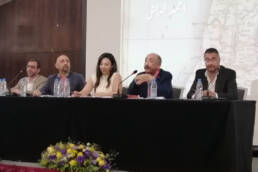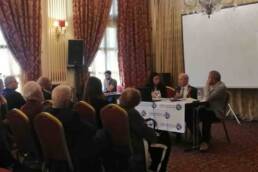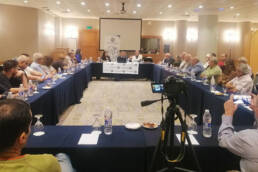The Centre for Arab Unity Studies held on Friday July 30, 2021 a webinar about the book of the late Dr. Abdel-Ghani Imad, Genealogy of the Other: Muslim and its Representation in Orientalism, Anthropology, and Sociology; which was issued by the Center in February 2020.
Participants of the webinar included: Dr. Sari Hanafi, the sociology lecturer at the American University of Beirut, director of the Center for Arab and Middle Eastern Studies, and Editor-in-chief of the Arab Journal of Sociology “Idafat”, as well as the president of the International Sociological Association since 2018 and founder of the online portal on the social impact of scientific research; Dr. Mouldi Al-Ahmar, Professor of Sociology at the Tunisian University and at the Doha Institute for Graduate Studies, and Editor-in-Chief of Omran Journal of Social Sciences; and Dr. Arous Zubair, a professor of sociology at the Second University of Algiers, a founding member of the Arab Network for Tolerance, a founding member of the Maghreb Forum, and director of the Questions and Visions magazine.
The webinar lasted for nearly two hours and was moderated by Obada Kasr, a researcher in the Center’s Studies Department. It was broadcasted live via the Zoom application and the center’s Facebook page.
Dr. Sari Hanafi’s intervention included some details of his personal relationship with the late writer. He presented an introductory summary of the book, saying that “the book is a critical view of the criticism of Orientalism…and rejected Edward Said’s understanding of Orientalism”, adding that “Imad’s view was open…and considered that we cannot put all orientalists in one basket”.
Dr. Mouldi Al-Ahmar discussed the importance of the book for researchers as well as students because of its brilliant history and tight linkage between the contexts in which the discussion took place on the subject, as well as the “excavation effort made by Abdel-Ghani Imad to reveal how Orientalism was historically shaped, using Previous researches”.
In his intervention, Dr. Arous Al-Zubair praised Abdul-Ghani Imad’s book, considering it “a summation of knowledge for a great research effort, then a focus on the issue of Orientalism”. On the other hand, he criticized some of what was stated in it, considering that “Orientalism is not a cognitive product of the Crusades, but rather a product of knowledge for the Western other in the phase of weakness, so he was looking for strengths on the opposite side, starting with Andalusia…”. Al-Zubayr added that “Abdul-Ghani Imad’s book neglected the orientalist’s vision of the Arab in particular, not the Muslim”. He added that “the writer did not present an evaluation vision of colonialism that believed in subjecting the Arab by all means, such as starvation, humiliation, and deprivation of means of livelihood to control him”. Al-Zubayr also said that the book neglected ethnographic studies. However, he considered at the end of his intervention that “without Orientalism, much of our memory and knowledge production would have been lost”, despite the fact that “the criticism of Orientalism came from many Orientalists who criticized the cognitive approach of Orientalism…”, as he said.
The Director of Studies at the Center, Dr. Youssef Al-Sawani, clarified that the book was an “introduction to a project”. In his last phone with the writer, few weeks before his death, Imad expressed “a measure of frustration” at not being able to complete this project, Sawani clarified. He added “the book missed some angles because it came as an introduction to a project, though it provides ground for students interested in the subject and can be part of the academic courses about Orientalism”.
At the end of the webinar, questions and interventions revolved around “The Repercussions of Orientalism on Our Arab Issues”. Al-Zubayr considered that one of the reasons for the failure of the recent Arab revolutions is “the rivalry between Democrats and the Islamists… and the Algerian case is the best evidence”. He considered that “we find references in the texts of Orientalism that still exist today, such as tyranny or stagnation… which are affixed to some Arab constitutions”.
The moderator of the webinar Obada Kasr concluded at the end by emphasizing on what Dr. Al-Sawani said assuring that “the book was the beginning of a project, but the writer passed away before achieving his dream project”.
If you are interested in reading this book Genealogy of the Other: Muslim and its Representation in Orientalism, Anthropology, and Sociology, you may order it here:
You can also watch the full webinar by clicking the link:
https://www.facebook.com/watch/live/?v=4226254397453437&ref=watch_permalink
مركز دراسات الوحدة العربية
فكرة تأسيس مركز للدراسات من جانب نخبة واسعة من المثقفين العرب في سبعينيات القرن الماضي كمشروع فكري وبحثي متخصص في قضايا الوحدة العربية
We appreciate your support
SUPPORT THE CENTRE FOR ARAB UNITY STUDIES
The Centre is reaching out for its friends and readers for support, whether by ordering our publications and paying for them in hard currency, or through donations. The Centre welcomes any support to boost its resiliency, to ensure its survival, the continuation of its legacy and its commitment to tackle issues facing the Arabs and the Arab world.



